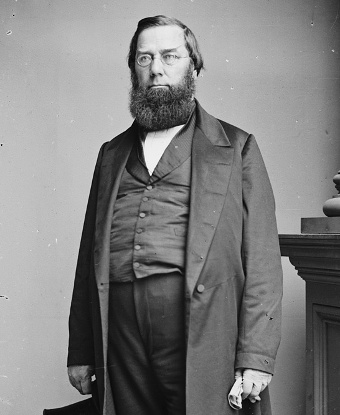Last updated: April 10, 2023
Person
George Perkins Marsh

Library of Congress
"I sat on a little stool between my father's knees in the two-wheeled chaise he always drove. To my mind the whole earth spread out before me. My father pointed out the most striking trees as we passed them and told me how to distinguish their varieties. I do not think I ever afterward failed to know one forest tree from another . . . what struck me, perhaps most of all, he stopped his horse on top of a steep hill, bade me notice how the water there flowed in different directions, and told me such a point was called a watershed. I never forgot that word, or any part of my father's talk that day."
George Perkins Marsh was born on March 15, 1801, in Woodstock, Vermont. He grew up in a wealthy American family. His father, Charles Marsh, was a US Congressman, and his mother was a homemaker. Marsh was raised as a strict Christian with a top-notch education. Because of poor eyesight, Marsh spent much of his childhood indoors, first reading and then being read to. Marsh attended Phillips Academy in Andover, Massachusetts, for high school and then went to college. He graduated from Dartmouth with highest honors at age 19. Following college, Marsh returned to Vermont to study law in Burlington. He passed the Bar in 1825 and became a lawyer.
Marsh married Harriet Buell, a songwriter, and they had two children, Charles Buell Marsh and George Ozias Marsh. By 1832, both mother and oldest son had died. George Perkins Marsh continued to practice law to support his younger son, but gave up in 1842 to pursue, like his father, a career in politics. From 1843 to 1849, he represented the Whig party in Congress as a representative from Vermont.
In 1849, then-President Zachary Taylor appointed Marsh ambassador to the Ottoman Empire. He worked as a civil servant until 1853, travelling abroad and negotiating for the release of American prisoners. In 1854, he returned to Vermont, where he began to focus on his writing. He published some of the earliest conservation status reports for the Governor of Vermont and eventually wrote his most important text, Man and Nature.
The central theme of Marsh's great work had been crystallizing in his fertile mind since he was a child. In the book, which is now considered the inspiration for the modern conservation movement, Marsh compared the destruction wrought on Vermont's landscape to the deforestation he had seen in Europe. By conjuring up images of Ancient Rome, Marsh showed how long-lasting the effects of environmental harm could be. He argued that man inevitably causes change to the natural world and it is up to him to decide whether it will be for the better or the worse. Humans had to be stewards of nature, he wrote, and make choices that would benefit the health of the entire natural world. Man and Nature was well received and widely read, laying the groundwork for the conservation movement of the 20th century, inspiring the Arbor Day movement, the establishment of forest reserves and the national forest service.
Marsh went abroad again in 1861, when Abraham Lincoln appointed him the minister to Italy. He served as a diplomat in Italy for 21 years until he died in 1882.
Today, Marsh's legacy is honored at Marsh-Billings-Rockefeller National Historical Park, the site of his birthplace.
